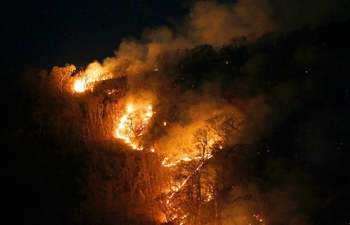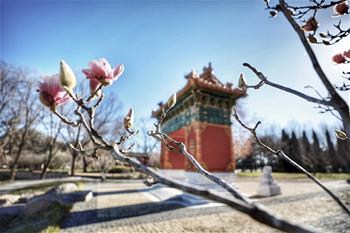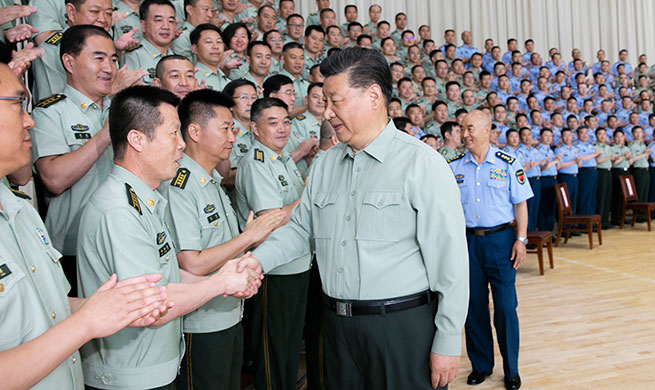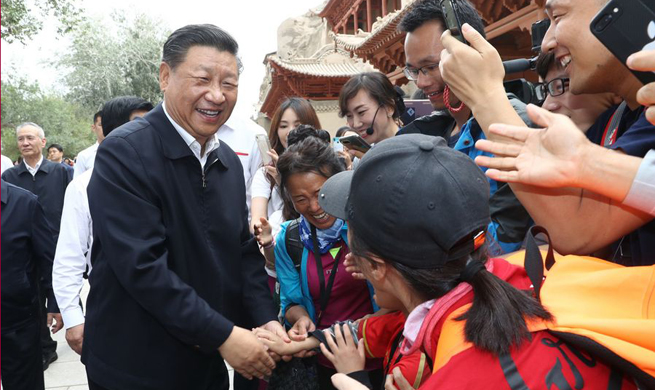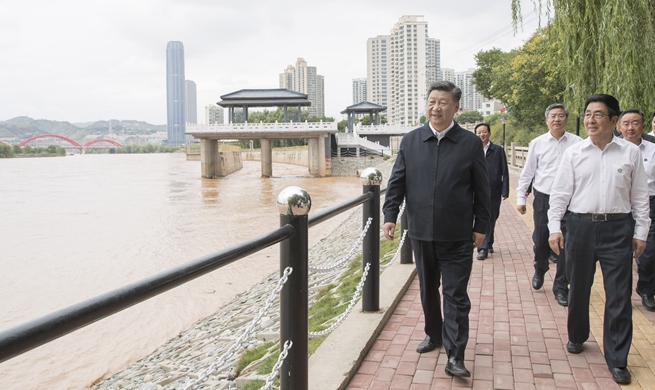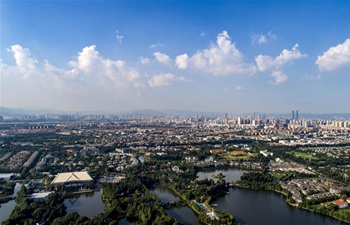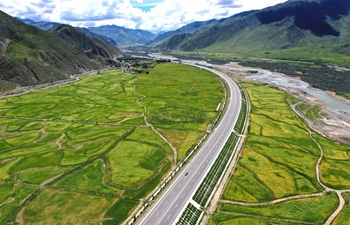ISTANBUL, Aug. 23 (Xinhua) -- The latest military strikes on Turkish targets indicate that Turkey may lose ground in Syria amid differences with both Russia and the United States on different fronts in the war-torn country, analysts said.
Turkey risks losing its position in Syria as the Russian-backed Syrian army offensive against jihadist rebels in Idlib advances, Cahit Armagan Dilek, director of the Ankara-based 21st Century Turkey Institute, told Xinhua.
On Monday, a Turkish military convoy driving through the Idlib province was struck, supposedly by Syrian jets, as the Syrian army moved to capture Khan Sheikhoun, a strategic town in southern Idlib.
Following Monday's strike, which left three dead and 12 others injured, Syrian jets on Thursday reportedly opened harassing fire near a Turkish military observation post in the area.
Turkey's deteriorating position around Idlib is further compounded, Dilek maintained, by Ankara's failure to take actions to eliminate the U.S.-backed Kurdish militia in the eastern part of the Euphrates River in Syria.
Amid Turkish threat of a cross-border military operation against the militia, which Ankara sees as terrorists, Turkey and the United States agreed early this month to jointly establish a safe zone in the Kurdish-held territory in northeastern Syria.
Dilek feels Washington would use the deal to keep Turkey away from a cross-border operation against the Kurdish militia, the People's Protection Units (YPG), which Ankara says is the Syrian offshoot of the outlawed Kurdistan Workers' Party.
Despite an overall agreement on the safe zone, the two sides are still far from reaching a full consensus on such vital details as the depth of the zone and who would control it.
Ankara warned Washington that it would move to eliminate the YPG if the United States would not keep its promises.
"Given the situation in Idlib, it's almost not possible for Turkey to launch a cross-border operation in the eastern part of the Euphrates," Dilek said, noting Ankara may also have to leave the areas under its control in the western part of the river in Syria.
On Wednesday, the Syrian forces captured Khan Sheikhoun, which lies on a key highway linking Damascus with the northern city of Aleppo under government control.
Seizing the town will make it easier for the Syrian army to take control of the rest of Idlib in northwestern Syria, the last major stronghold for rebels.
Idlib will apparently be the place which will set in motion the conditions for the withdrawal of Turkish troops from Syrian territory, remarked Dilek.
Other than having troops in 12 observation posts around Idlib, Turkey also controls the al-Bab and Afrin regions in northwestern Syria, which it captured from the Islamic State and the YPG respectively in past operations.
The risk for Turkish targets in Idlib to be struck by the Syrian army is still there, said Yasar Yakis, a former Turkish foreign minister, as he referred to Moscow's support for the Idlib operation.
Turkey's military observation posts around Idlib were set up under a deal with Moscow reached in Russia's Sochi in September last year to monitor a now-failed cease-fire between the Syrian army and the rebels.
Following the deadly strike on the Turkish convoy, Turkish Foreign Minister Mevlut Cavusoglu warned Damascus on Wednesday "not to play with fire."
Ankara also underlined that there is no question of removing its observation posts in Idlib.
Turkey's southernmost observation post in Idlib, around which some fleeing rebels have reportedly gathered, is now encircled by the advancing Syrian forces.
It is as wrong for Turkey to adopt a position contrary to international law in Idlib as it is to carry out a cross-border operation against the Kurdish militia, Yakis told Xinhua.
Despite Ankara's protest regarding the Idlib offensive, Moscow stressed that the offensive would continue, underlining that the Sochi deal with Turkey does not prohibit fighting against terrorist groups.
Russia's response reveals that it supports the attack on the Turkish convoy, which, Syria said, was carrying weapons for rebels, said Yakis.
"In case this confrontation escalates, it would be more difficult to defend the Turkish position (in Syria) as far as international law is concerned," he added.
"Turkey's policy of appealing to the U.S. and Russia at the same time or use them as a trump card against each other in Syria has failed," said Dilek.
The Idlib province is largely controlled by the al-Qaeda-linked Hayat Tahrir al-Sham, while Ankara backs some of the so-called moderate rebel groups there.
Russia criticized Turkey for having failed to block rebel attacks on Russian and Syrian military positions as agreed under the Sochi deal.
However, both countries expressed their commitment to the deal, a result of the efforts by the so-called Astana partners, Russia, Turkey and Iran, to push for a political settlement of the Syrian conflict.
The three partners are scheduled to meet again next month in Ankara in a bid to iron out differences over a political settlement in Syria.
Neither of the analysts thinks Ankara and Moscow would allow the Idlib issue to poison their close ties which range from energy to defense industry and economy.
"Because both countries use the bilateral ties, which are not devoid of problems, as a trump card against the U.S.," stated Dilek.
Noting the two countries have long managed to compartmentalize their relations, Yakis said, "I also expect this to continue more or less like this in the future."
Turkey fears the Idlib offensive, which essentially began in late April, may substantially increase its burden of Syrian refugees, as Ankara is already hosting some 3.6 million of them on its land.
According to the United Nations, more than 500,000 people have left the Idlib province since April, with most of them seeking refuge near the Turkish border.
Both analysts agreed that Ankara should revise its Syria policy and start political dialogue with Damascus so as to get out of the Syrian quagmire with minimum damage.
"Turkey should cooperate with Damascus regarding the Kurds in northeastern Syria, because its interests correspond with those of Damascus' in this regard rather than with those of Washington's," said Yakis.
Ankara's policy regarding Syrian Kurds should be consistent with the policy Damascus is expected to pursue after all foreign powers leave Syria, he argued.
Ankara is concerned that a Kurdish autonomy along its border in Syria may set a precedent for its own Kurdish population of nearly 20 million.
Turkey's direct dialogue with Syria is what the United States least expects and what Ankara should do to spoil the game in Syria, remarked Dilek.
Ankara should hand over the areas under its control in the western part of the Euphrates to Damascus, increasing thereby the pressure on the United States to leave Syria, he argued.




